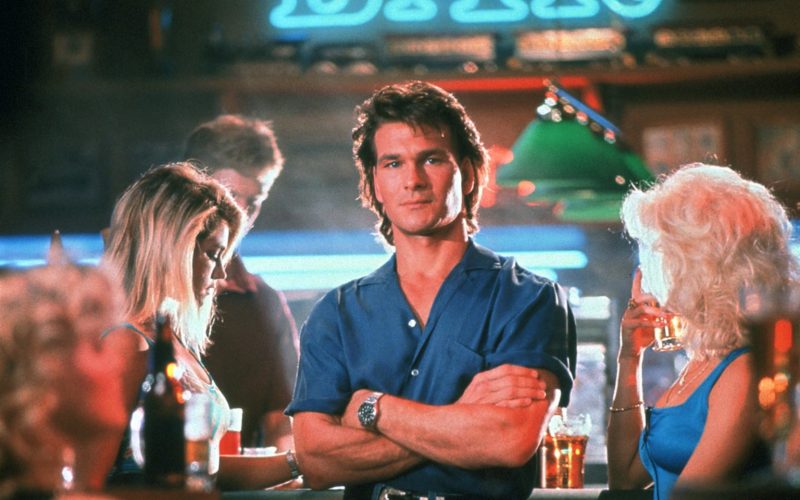Road House (1989).
It’s often that you’ll hear a film described as “So bad that it’s good”, a term I sometimes even use myself and I’m equally sure you’ve also heard people say that to enjoy a certain type of film “You just need to not think too much” or “Just switch off your brain and enjoy it”. I’m fast coming around to thinking that we should stop trying to justify our enjoyment of a movie by using such lazy, cliché-ridden and often contradictory terms.
This may well come back to haunt me in future episodes of The Film ‘89 Podcast, but I’m going to try and stop using these terms as a means to justify my enjoyment of a film whose objective quality may be in certain quarters rather questionable.
Road House definitely falls into that type of film referenced by my new proclamation of intent. Upon its 1989 theatrical release, lauded film critic, the late, great Roger Ebert of the Chicago Sun-Times gave the film 2½ out of 4 stars and said that, “Road House exists right on the edge between the ‘good-bad movie’ and the merely bad. I hesitate to recommend it, because so much depends on the ironic vision of the viewer. This is not a good movie. But viewed in the right frame of mind, it is not a boring one, either.” The film has earned a 38% approval rating on Rotten Tomatoes based on 40 reviews and a slightly healthier score of 6.6/10 on IMDb.
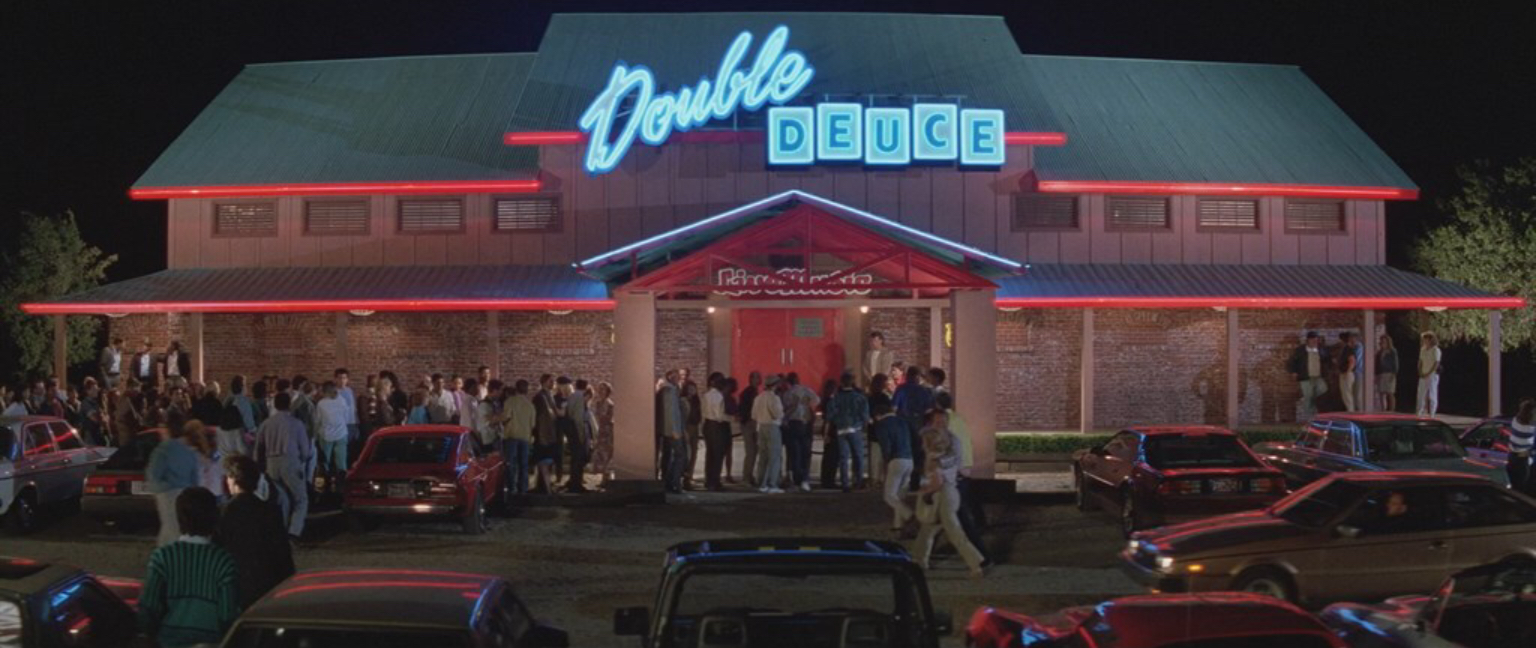
Road House celebrates its thirtieth anniversary this year and the intent of this article is geared towards being a celebration of what few could dispute as being the greatest movie ever made about Nightclub Bouncers (or coolers as the film refers to the role). As much as the film is essentially a time capsule of the 1980s, it’s still a film that deserves recognition. It’s jam-packed full of mullets and attitude, roundhouse kicks, good-ole rock tunes and questionable fashion choices. It has over-the-top fight scenes and lashings of Patrick Swayze’s character Dalton’s mock-philosophical dialogue.
Road House opens in the tradition of the gunslinger-for-hire Western with the mysterious stranger coming to a new town and taking on the tyrant that is ruling it with fear. It could even be seen as a modern day Medieval tale, where the local townsfolk quiver under tyranny until the arrival of a new champion who will not only defend them, but also inspire them to rise up in revolt against their evil overlord’s reign.
Dalton (Swayze) is a professional “cooler”, a specialised security chief with an untold mysterious past. A modern day legend in his chosen field who is enticed from his job at a club in New York City by Frank Tilghman to take over running the security at his club/bar, the Double Deuce, in Jasper, Missouri. Tilghman (Kevin Tighe), explains that he’s come into a sizeable inheritance which he plans to invest in his club to enhance its image, and to help protect his investment he needs a first-rate cooler like Dalton, not only to first clear out the trash, but to also maintain its stability afterwards.
Our introduction to Dalton shows us that whilst Road House may stretch the limits of realism somewhat, that Dalton is far from being in the mould of the invincible superhero. In the opening fight, Dalton is slashed across his arm by a knife wielding patron. This scene gives us all the character exposition we need to know about him. Dalton is more than willing to take the blow. He then proceeds to accept an invitation to step outside with his attacker, only to simply walk away once the threat has been removed from the premises. Returning to a back room office to stitch up his own wound. It’s nothing personal to him. It’s part of the job. Another night, another scar. It simply comes with the territory.
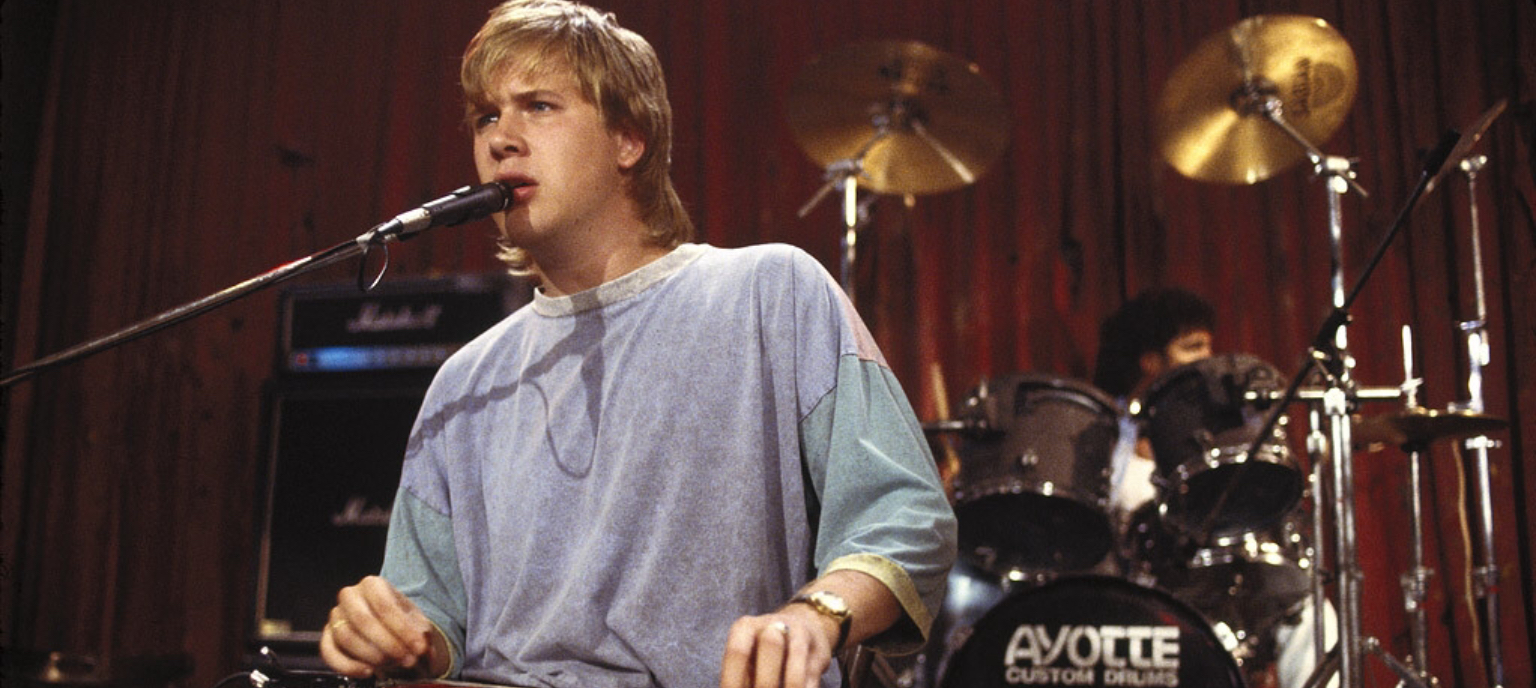
When Tilghman appears mid-medical procedure, Dalton has no loyalty to his current employer. As long as his financial and managerial demands are met, he’s more than willing to accept the proposal. He informs his new employer to expect him whenever he arrives. Dalton won’t be accepting any free airline tickets. He’ll make his own way. Dalton isn’t the kind of guy that accepts perks or anything that falls outside of his very clear morality and code.
When Dalton arrives he parks his beat up ride vehicle outside a parking lot and tosses the keys to an old bum on the sidewalk outside. This small part is played by a staple of ‘80s bum/drunk/gruff character roles, Chino ‘Fats’ Williams, who played similar roles in other ‘80s classics such as The Terminator, Rocky III, Weird Science and Action Jackson. Dalton tosses the keys to Fats and gifts him the vehicle, establishing another nice character trait, that Dalton sees most of his comforts as being disposable. A new town, a new job, even a new lover. It’s all taken in stride. This is what his life is up until now. His only real connection to any semblance of anything meaningful being his friendship with his mentor Wade Garret and his beautiful automobile which sits covered up inside the parking lot, ready to take him to the next chapter of his life.
Whilst we are on the subject of cars, Dalton’s Mercedes 560 SEC coupe was picked by the film’s producer Joel Silver who personally chose the car in Diamond Blue paint, and also saw to picking out the exact shade of window tinting and the the type of wheels. Two of the cars were used in the film. One ran through a fence, flipped over and exploded into flames. The undamaged and lesser used sister car was purchased by Swayze after Road House wrapped. I’ve since found a car auction site from 2014 selling this same car.
When Dalton first arrives at the Double Deuce Bar it’s clear why his help was required with its questionable clientele and shady employees that Dalton immediately sets out to put straight with his “My way or the Highway” approach. This of course doesn’t sit well with some and one such victim of Dalton’s cull is head bartender, Pat McGurn who’s been skimming off the bar profits for some time, but had felt that he was untouchable due to family connections within the town. Pat’s uncle, as we later find out, is none other than the villain of the piece, Brad Wesley, played with aplomb by the brilliant Ben Gazzara. An overlooked entry on the list of contemporary bad guys of this era’s action movies, which is usually topped by the likes Of RoboCop’s Clarence Boddicker and Die Hard’s Hans Gruber.
Wesley definitely sits below these two bad guy behemoths, but is a more than adequate foil for Dalton and the requirements of this particular story. You could see Road House as an R-rated version of The Dukes Of Hazzard, with Wesley running Jasper County with an iron fist, far more so than that show’s comic protagonist, Boss Hogg.
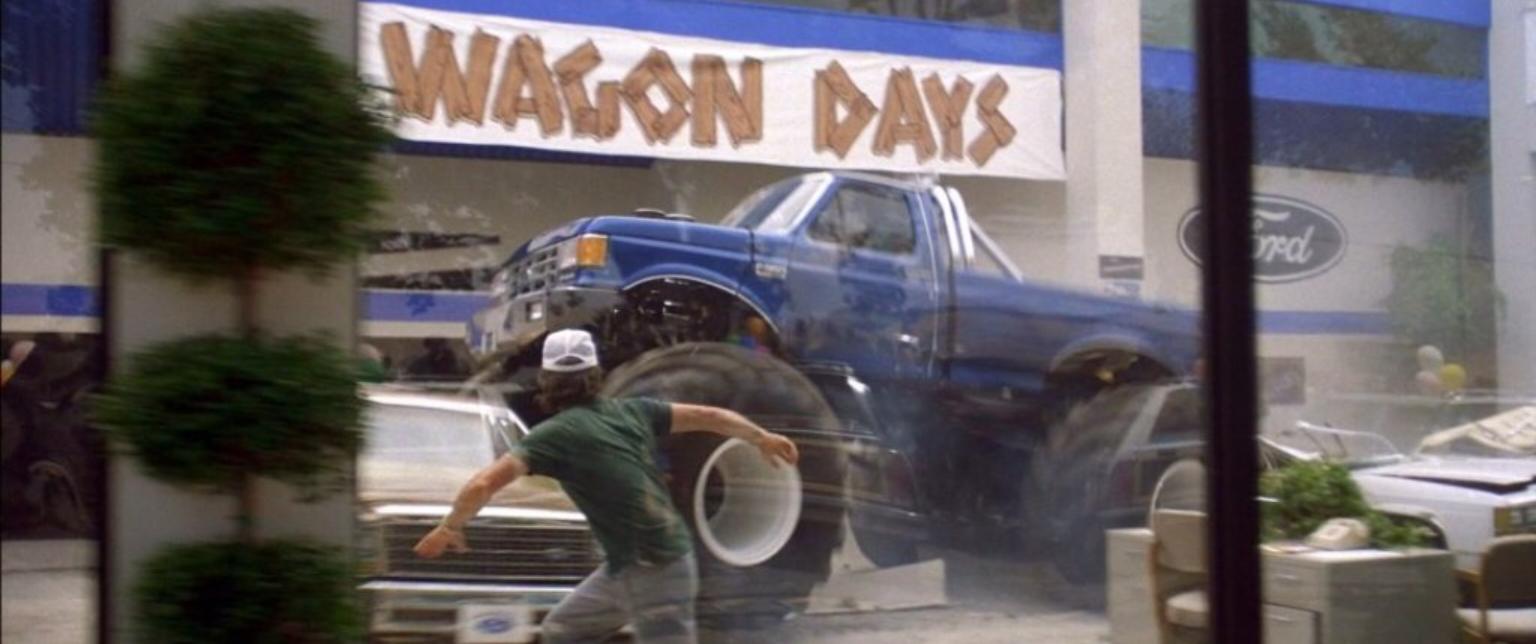
A man of seemingly endless wealth, Wesley lives in a huge mansion and if he’s not flying around scaring the local wild stock in his helicopter, he’s swerving along the highway in perfect timing to his car’s stereo, running other road users into the dirt side-tracks. Wesley made his fortune through the extortion of the local business community, skimming their profits via his protection racket scheme, operating under the guise of a business community union group. Wesley is used to having his demands met, otherwise swift retaliation will follow. When Tilghman refuses to overturn Dalton’s decision to fire McGurn, the battle lines are quickly drawn and the more Wesley comes down harder, the more Dalton will fight back. As time passes, Dalton begins to realise that this may be more of a challenge than just tossing out the local drunks and in an unconscious cry for help, he finds himself reaching out to his mentor, Wade Garrett to ask if he’s ever heard of Wesley.
Such a mentor character as Wade is nothing new to this type of story, but what sets the character of Garret aside from the norm is that he’s not the wise, advice dispensing old Kung Fu Master, sitting cross legged in a mountain top temple. Neither is he the broken down old pug of a Mickey Goldmill, barking out instructions at his student. He’s Wade Garret the toughest hombré to ever work the floor and this original take on the mentor character was simply made to fit Sam Elliot, with his rugged good looks and distinctively gruff voice, he’s as Southern as a Southern gentleman can be and yet also conveys the confidence of a man who could take you out with a single kick to the kneecap. The kind of guy that’ll amuse himself with a joke that nobody else will be around to hear, such as his renaming of Tilghman’s bar as “The Double Douche”. He’s happy to just let the wind carry his humour along the open plains. His gift to God if you will.
When we first meet Wade he’s still very much active and in the thick of it. Calming down rambunctious marines at a wet G-string contest in some seedy bar. Diffusing the situation before it’s had a chance to explode. A man more than ready to go into battle, but more wise now, with age giving him the knowledge that there’s usually an easier outcome than to simply fight.
Garrett is a window into the future that Dalton has in front of him. Battered and weary, yet still stuck in the role that has defined his existence. Although still more than capable of handling most situations, the bruises now take longer to heal and the permanency of his limp suggests that some of his wounds will never heal. If Dalton is the white hatted hero, here to save the day, Garrett is the old gunslinger, sat in the corner of the saloon, who will only endeavour to push up the brim of his Stetson to once again reach for his six shooter if he absolutely needs to.
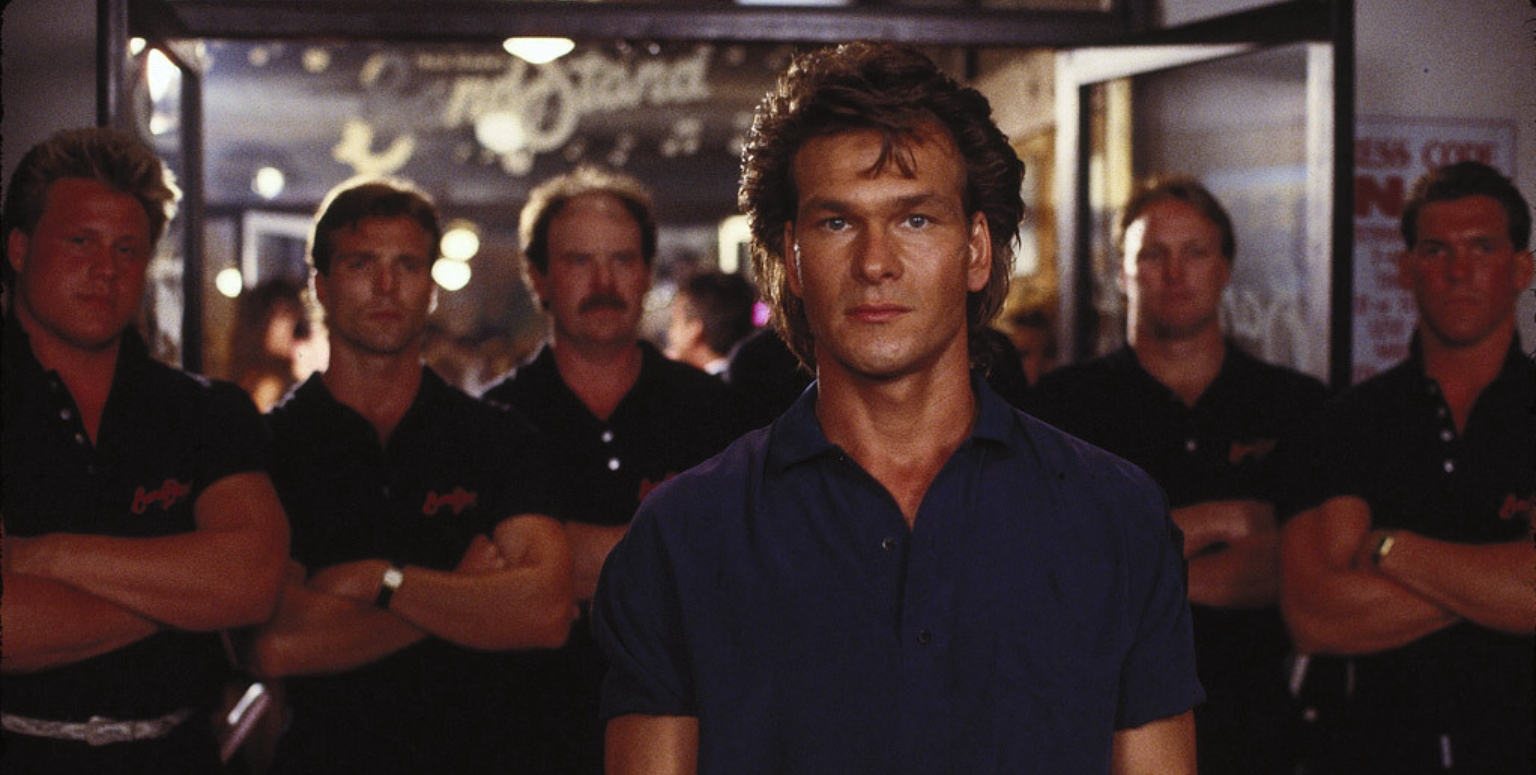
When Dalton asks him to stand beside him and fight, Garrett offers a different approach, to simply walk away. Garrett knows Dalton better than anyone and more importantly, he knows the demons that his younger counterpart carries with him, briefly alluding to the time that Dalton killed a man who was about to shoot him. Dalton’s lethal weapon of choice that night was his hands, he doesn’t need a weapon, he is one. Tearing out the jugular of his would-be killer with a solitary strike of his tiger claw.
While Dalton is an example of calm under pressure to all that work with him, he has nothing on Garrett’s life experience. The type of experience that Wade yells out to Dalton that this is not his fight. That this will not end with a swift roundhouse kick to the chin or a trip to the local hospital for stitches. Garrett knows how this will end and he tries his best to guide Dalton over to his way of thinking. You get the impression that he has nurtured his younger counterpart for so long that he knows that the only way Dalton will change his mind is if he comes to his own conclusion to walk away and eventually he does, but only when it’s too late.
To ruffle the hornet’s nest further, Dalton catches the eye of the object of Wesley’s desire in the form of Doc (Kelly Lynch). Brad Wesley has his own trophy squeeze in the form of the seductive blonde bombshell Denise (Julie Michaels), but Brad Wesley isn’t a man who likes to be told “No” and this is just what Doc did even before Dalton rode into town.
Doc is perhaps the only combatant worthy of taking on the mighty Dalton. As a doctor she obviously has the brains. When she’s in work, she wears large black rimmed glasses and ties her long blonde hair up in a bun. However, when she decides to take up Dalton on his emergency room invite of a drink at the Deuce, she turns up with her long locks flowing and wearing a gingham checked, figure hugging dress. She’s a country girl at heart and Dalton is now locked in her tractor beam.
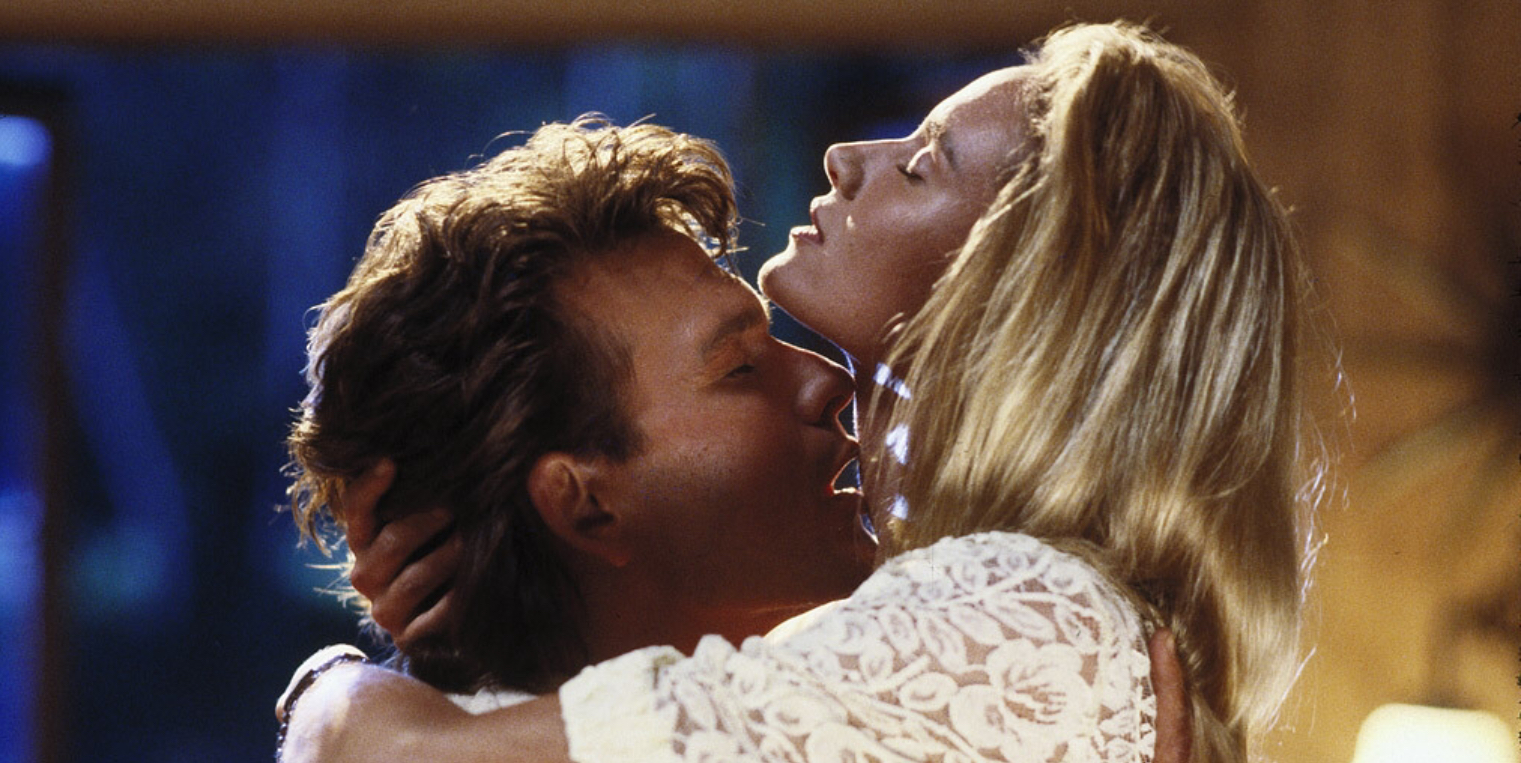
Road House could be seen as Swayze’s attempt to cast off the shackles of the Dirty Dancing role that thrust him into the leading man spotlight. It was rumoured that Swayze had refused to reprise the role of the snake hipped lothario Johnny Castle in a sequel in an attempt to broaden his career options, yet early promos for Road House carried the slogan, “The dancing is over. Now it’s time for him to get dirty!” The sex scene between Doc and Dalton is suspiciously reminiscent of that of Baby and Johnny in Dirty Dancing and even features Swayze scanning the radio dial, only for him to settle upon the Otis Redding track “These arms of mine” as the suitable accompaniment to his love making.
To add insult to injury, a post-coitus Dalton and Doc, lay naked on the tin roof of his first floor barn balcony just so Brad Wesley can watch their naked, sweaty forms from the ivory towers of his luxurious abode, that happens to be handily posited opposite Dalton’s new home, separated by the river that divides them, like some sort of medieval moat between two warring factions.
If Dalton providing hope as the white knight to the townsfolk isn’t enough to anger Wesley as the Black Knight, he has now stolen his maiden. One could draw references to this being a modern day take on Robin Hood, with Dalton taking on the role of the titular hero who will rally against the tyranny of The Sheriff of Nottingham and steal his Maid Marion in the process. Prior to taking on the evil king, Dalton will have to take on Wesley’s chief henchman, his Sir Guy of Gisbourne if you will, in the form of Jimmy (Marshall R. Teague) “Head-Henchman” of Wesley’s ragtag League of Redneck Evil. Jimmy is a sort of Bizarro World version of Dalton, who it would appear was all too happy to accept the blood money on offer from his employer to carry out his bidding. An offer that Dalton rebukes when Wesley makes a similar proposition.
Jimmy is however, a more than worthy opponent for Dalton’s highflying spin kicks and proves his worth prior to the two men’s inevitable showdown. After we have a striptease from Denise, Jimmy is the next of Wesley’s crew to put on a show at the Double Deuce. With the same musical accompaniment, he backflips off the stage and performs a series of well choreographed moves with a pool cue, prior to taking out some of the lower ranking club’s security staff.
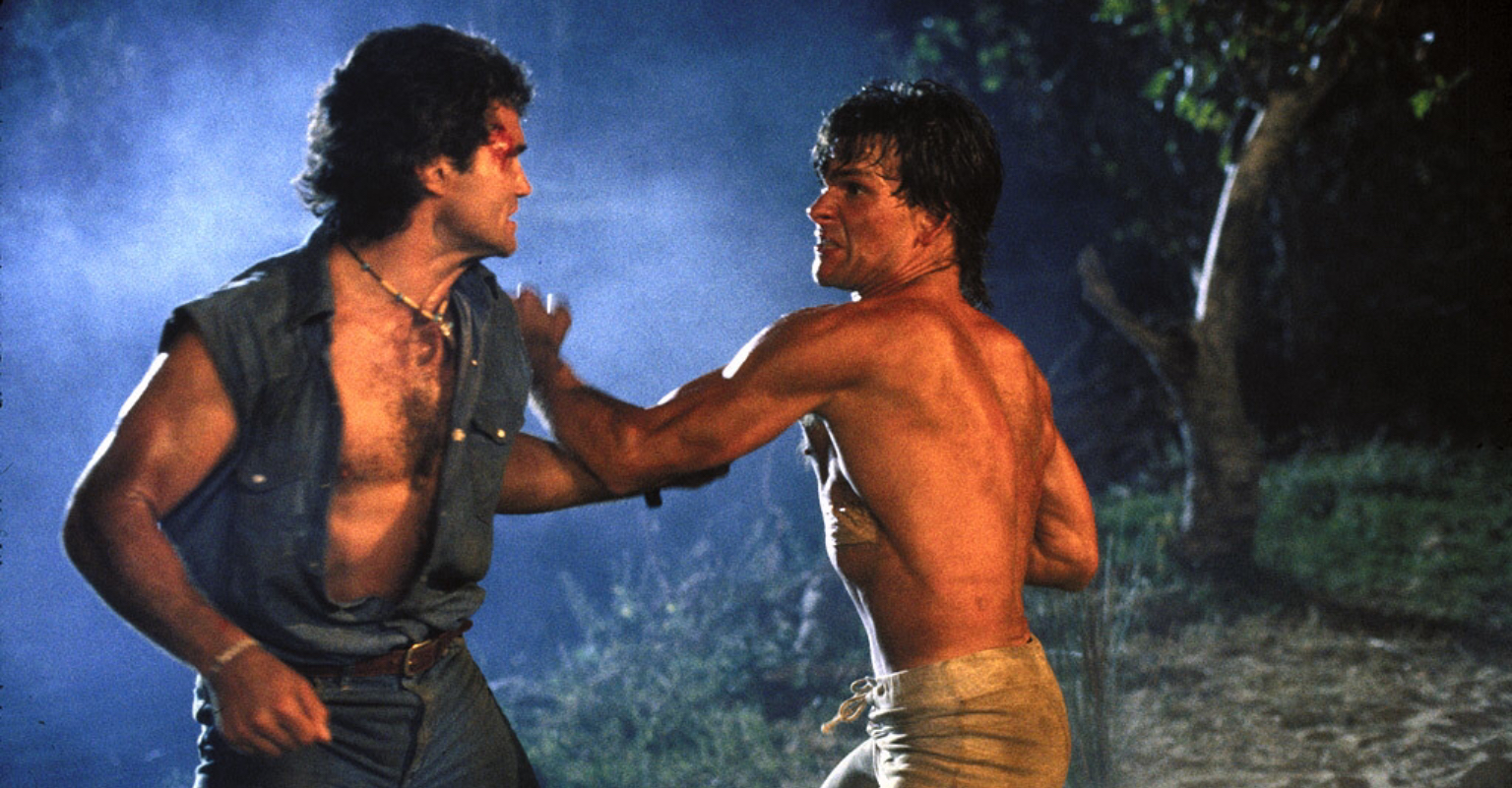
Jimmy then proceeds to not only call out Dalton’s mentor, but also seems to be fast gaining the upper hand over Garrett, with his dirty tactics of low kicks to the ageing warrior’s already injured knees, prior to Wesley seemingly saving Garrett the embarrassment of defeat by firing his pistol in the air to signal an end to the proceedings. I say seemingly, as it soon unfolds that Wesley has far more sinister plans afoot for both Garrett and Dalton beginning with an arson attack on the farm where Dalton is staying, which leads to the fight we’ve all been waiting for between him and Jimmy. Of course we get the high flying, almost ballet like style of Dalton verses the far more down and dirty style of Jimmy, who again appears to be getting the upper hand and has even more sinister intentions towards his almost defeated foe, when he tells the seemingly exhausted Dalton,
“I used to fuck guys like you in prison!”
This seems to be the boost required to provide Dalton with the motivation to not lose consciousness and come back with a succession of kicks that leaves Jimmy on the brink of defeat. Of course Jimmy isn’t one to abide by Queensbury Rules and this sees him resort to breaking the warriors code and pulling a gun, resulting in Dalton instantly reverting back to the deadly move that he’s been haunted by all these years as he tears out the windpipe of his would-be killer. Exhausted from battle and ashamed that Doc has seen what he’s done, Dalton drags the lifeless corpse into the river and sends it floating back towards Wesley’s mansion, screaming in anger at what he’s allowed himself to become again.
This anger and regret leads Dalton to decide to return back to the role he had adopted prior to him coming to Jasper County, that of a Nomad. Never staying in one place too long. Never letting people find out about his past. He tells Garrett that they are leaving town, much to the pleasure of his aged compatriot but is then drawn back into Wesley’s game with a phone call from Brad giving Dalton the choice of who he wants saved, Doc or Wade. When Dalton refuses, Wesley tells him that their fate will now be decided upon the toss of a coin. When Dalton returns from saving Doc he finds his oldest friend dead on the bar of the Double Deuce with a message stuck through his chest with a large hunting knife. The message reads, “Tails, you lose”.
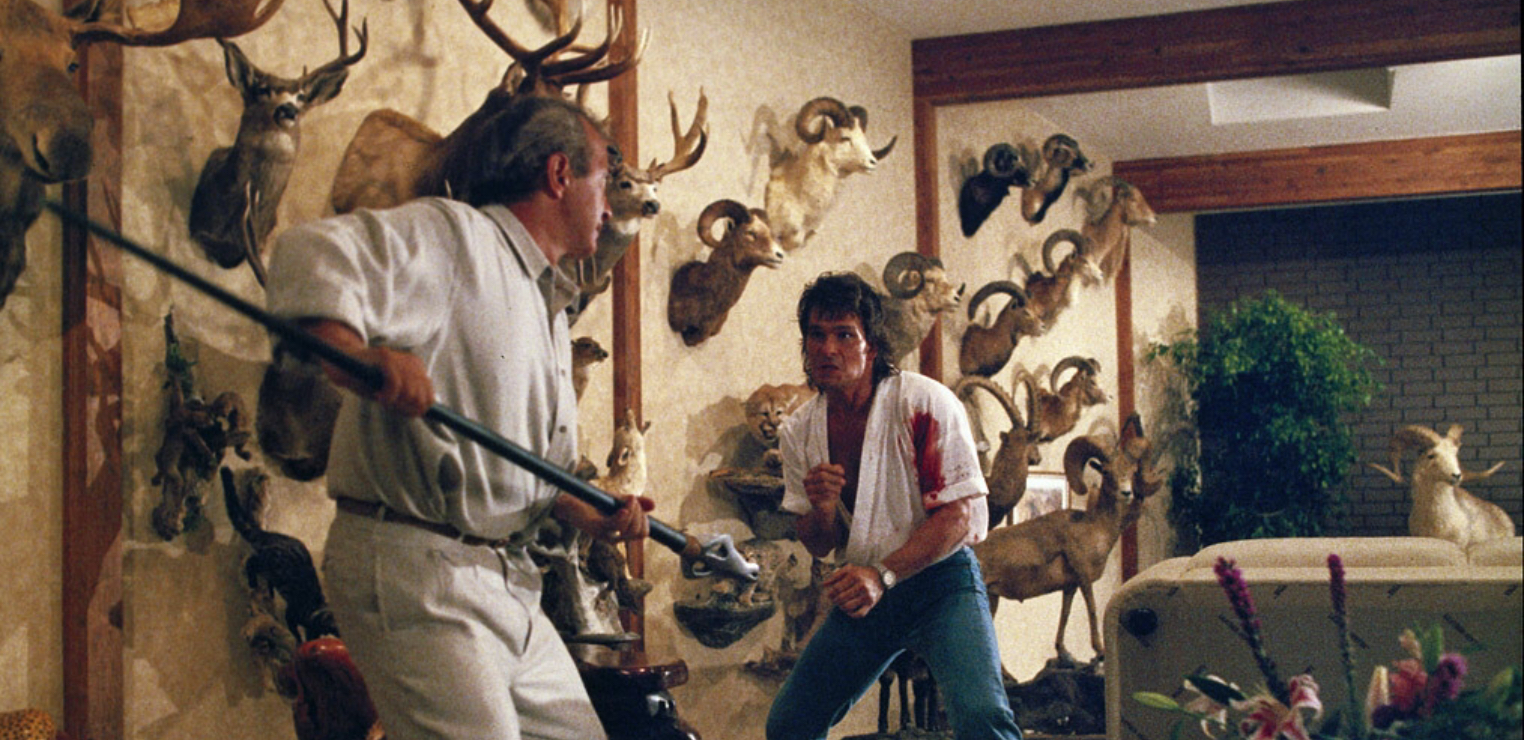
Dalton knows now that there’s only one course of action left in order to avenge his fallen friend and that is to stage a one-man assault on Wesley’s mansion, which has now been turned into a fortified base, with all of his henchmen stood on guard. Dalton uncharacteristically signposts his initial assault as his Mercedes crashes through the grounds under a hail of bullets from Wesley’s guards, only to flip and burn at the doorstep. Of course Dalton isn’t in the vehicle when it draws to a halt and in a wonderful piece of visual storytelling, the guard that opens the car door finds the knife that killed Garrett stuck to the gas pedal. The guard forces the blade free and slides it into the empty sheath that hangs from his belt, telling us with just visuals that it was his knife and that he killed Wade. Obviously at this point his card is marked and soon he dies by his own blade as Dalton takes out all bar one of Wesley’s army before facing off with the main man himself. As great a job as Ben Gazzara does in bringing this pantomime villain to life, he isn’t a match physically for Dalton but this is quickly amended by Dalton taking a bullet to the shoulder to swiftly even the odds as Wesley beats him with a tribal spear in his suitably adorned trophy room full of stuffed wildlife. The lead-up to this scene epitomises the ‘80s action film with Dalton seemingly now in possession of Commando-like abilities, taking out bad guys with a mix of stealth and strength.
The climactic final fight is accompanied by Michael Kamen’s score which sounds suspiciously like the music he used when Hans Gruber plummets from Nakotomi Towers in Die Hard except we don’t get a slow motion falling Alan Rickman, but a terrified Brad Wesley pinned to a chair with Dalton’s clenched fingers hovering above his jugular. Will Dalton once again succumb to his more base instincts and let rip with his default killer move? Thankfully Doc runs in and screams at him to stop.
Leaving Wesley crumbled and beaten, Dalton turns his back to walk towards his love, allowing Wesley the opportunity to draw a concealed handgun, only to then be shot by an assortment of local traders who have finally risen up in defiance.
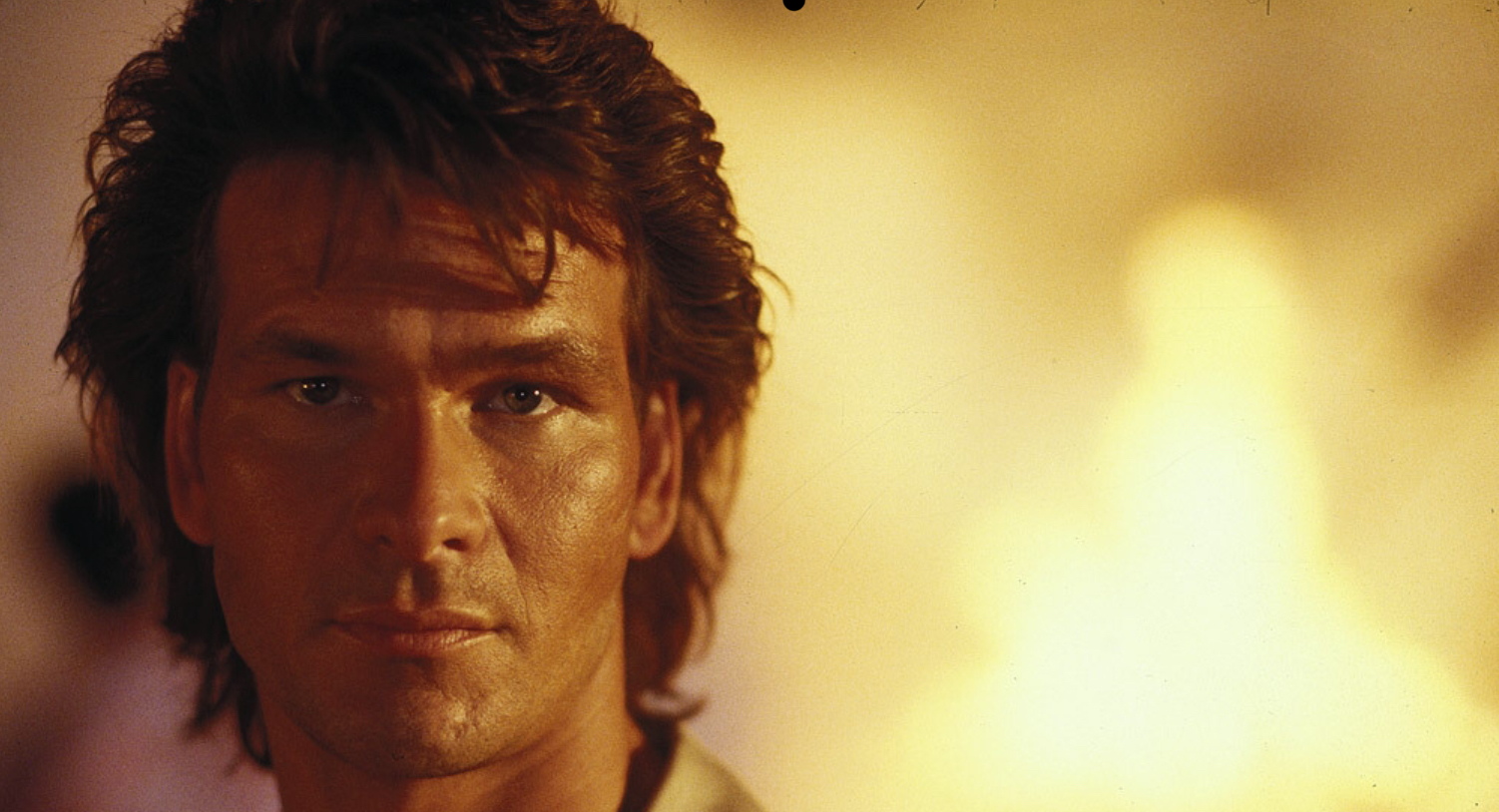
Best not to ask how the traders, including Tilghman and Doc’s Uncle Red got there and why these shotgun wielding men not only allowed Doc to enter before them into a fire fight or not step in earlier to help Dalton is given no explanation, this is an ‘80s action film, such implausibility is par for the course. The police swiftly arrive after the guns have been taken away and perhaps the best legal defence in history is used. Everyone present tells the Police Chief that they “didn’t see anything”. Case closed!
To conclude, I’m not in any way shying away from the fact that Road House is, by most objective standards, fairly absurd. It falls apart under scrutiny regarding some of its plot’s internal logic but given that it very much falls into the category of ‘80s action film, by that particular sub-genre’s own standards, it’s one of the more plausible and finely crafted entries in an over stuffed genre known for pushing the boundaries of credibility. What Road House undeniably is is a wildly entertaining film that, much like most other ‘80s action films, should be fairly compared to its peers. It has great performances from the charismatic Swayze, the wonderfully gruff and ever reliable Sam Elliott and some coolly sneering bad-guy brilliance from Ben Gazzara. It’s satisfyingly action packed, has some great, quotable dialogue and has to be given an extra point for being the best film there is about bouncers. And if nothing else, Road House gave us some valuable pearls of wisdom, none better than Dalton’s mantra of, “I want you to be nice until it’s time to not be nice.” Words we should maybe all try and live by.
Film ‘89 Verdict – 8/10

